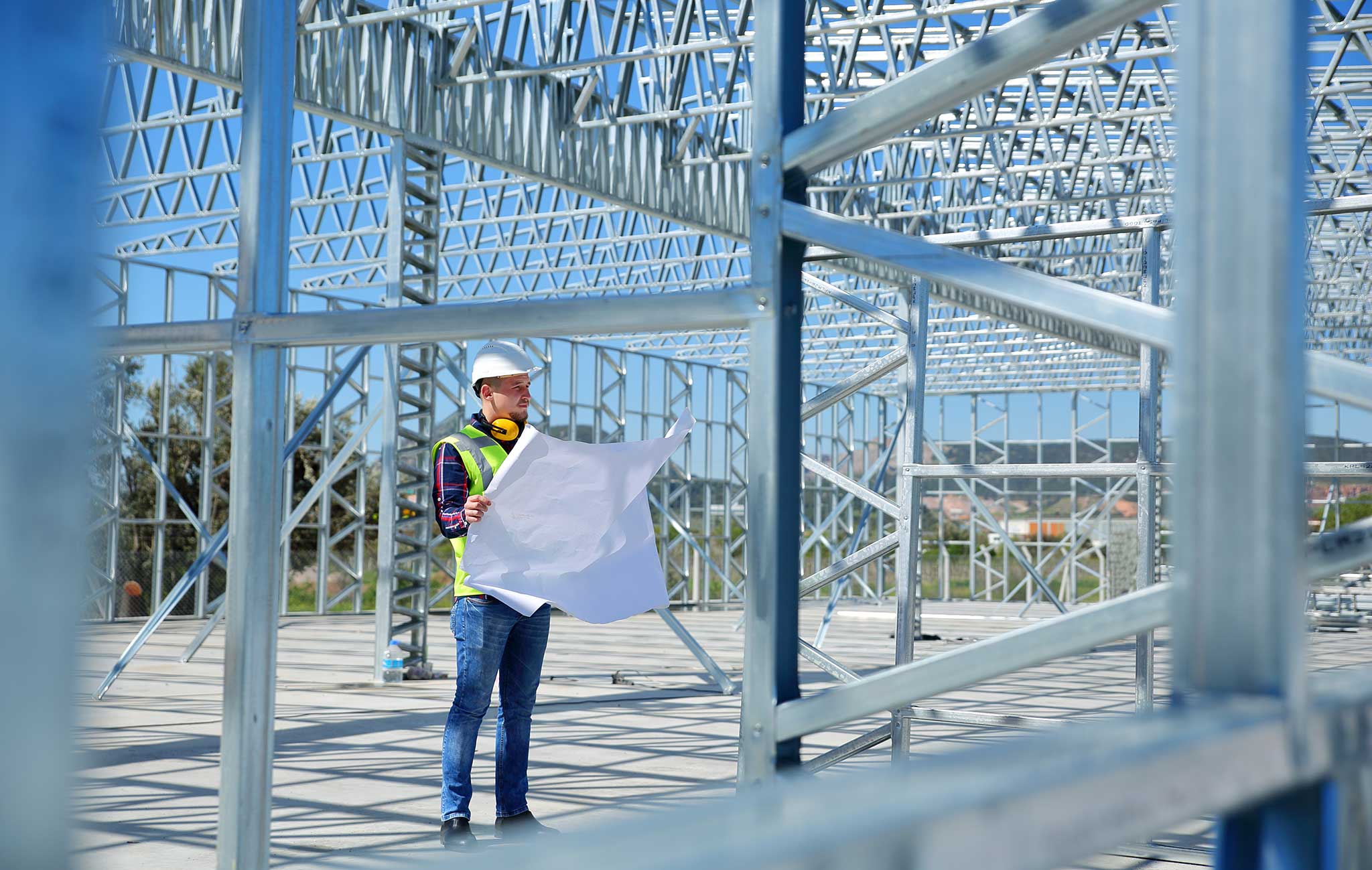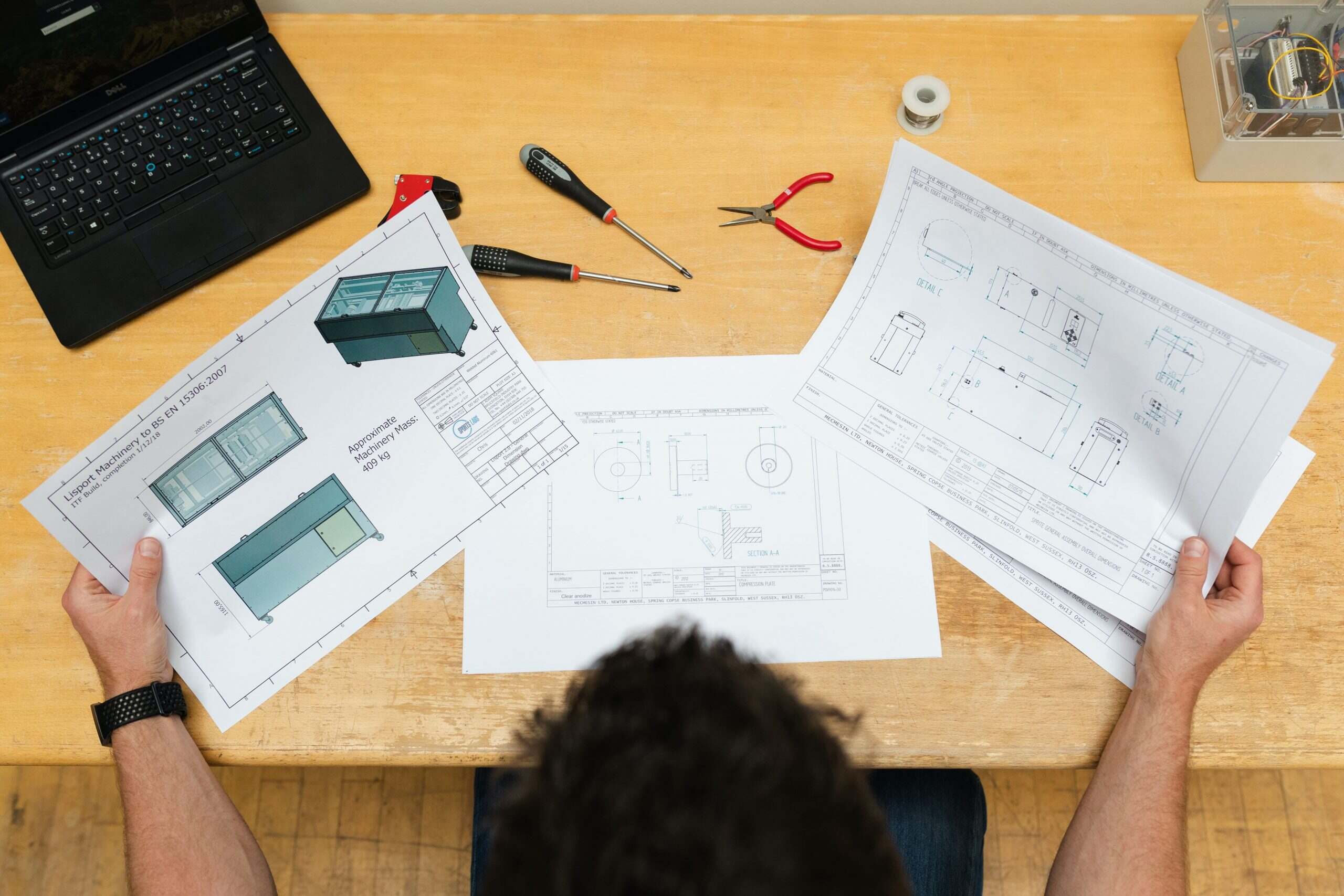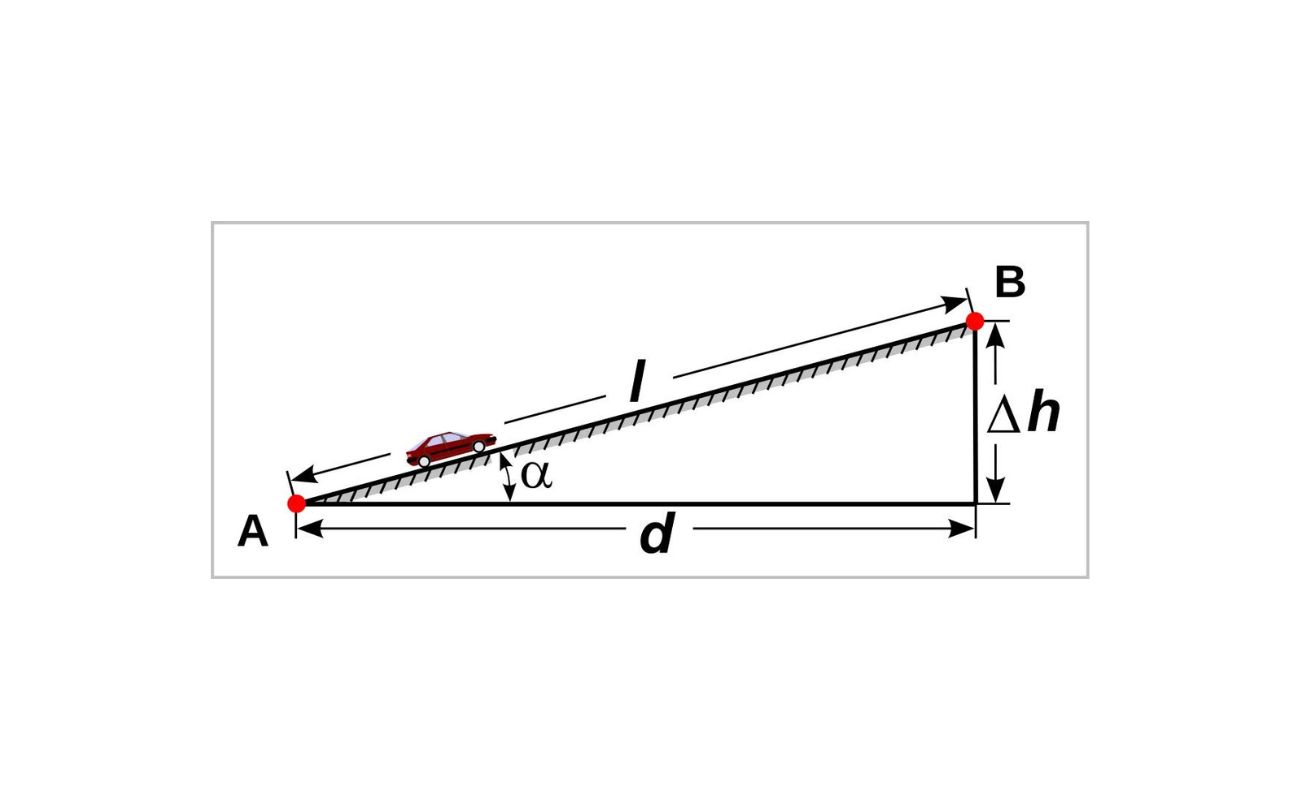Home>diy>Building & Construction>What Do Civil Engineers Do In Construction


Building & Construction
What Do Civil Engineers Do In Construction
Modified: January 6, 2024
Discover the important role of civil engineers in building construction. From designing structures to managing projects, learn how they ensure safe and efficient construction processes.
(Many of the links in this article redirect to a specific reviewed product. Your purchase of these products through affiliate links helps to generate commission for Storables.com, at no extra cost. Learn more)
Introduction
Civil engineering plays a crucial role in the construction industry. It involves the planning, designing, and management of infrastructure projects, with the aim of creating safe, functional, and sustainable structures. Civil engineers are the backbone of construction projects, ensuring that everything from roads and bridges to buildings and dams are built to withstand the test of time.
In this article, we will explore the roles and responsibilities of civil engineers in construction and examine how they contribute to the successful completion of projects. From planning and design to project management and quality assurance, civil engineers are involved in every stage of construction, ensuring that projects are executed efficiently and in compliance with regulations and standards.
Moreover, civil engineers are constantly adapting to advancements in technology, incorporating innovative tools and software to enhance the construction process. They also play a vital role in addressing construction challenges and ensuring the safety and sustainability of structures. Let’s delve deeper into the world of civil engineering in construction and discover the integral role these professionals play in shaping our built environment.
Key Takeaways:
- Civil engineers are the linchpin of construction projects, overseeing planning, compliance, project management, and problem-solving. Their expertise ensures safe, sustainable, and innovative structures that shape our built environment.
- Leveraging technology, collaboration, and a commitment to safety and sustainability, civil engineers drive the construction industry forward. Their adaptability and dedication ensure the successful completion of projects while leaving a lasting impact on society.
Read more: What Do You Study In Civil Engineering
Roles and Responsibilities of Civil Engineers in Construction
Civil engineers are responsible for a wide range of tasks in the construction industry. Their expertise and knowledge span various disciplines, allowing them to contribute to every aspect of a construction project. Let’s take a closer look at some of the key roles and responsibilities of civil engineers in construction:
- Planning and Design: Civil engineers are involved in the initial planning and design stages of a construction project. They collaborate with architects and other professionals to develop project specifications, considering factors such as structural integrity, functionality, and aesthetics. They analyze site conditions, conduct feasibility studies, and create detailed construction plans.
- Ensuring Compliance: Civil engineers ensure that construction projects comply with local regulations, building codes, and safety standards. They stay updated on the latest guidelines and requirements to ensure that the structures they design are safe and legally compliant. They also obtain necessary permits and approvals from relevant authorities before commencing construction.
- Project Management: Civil engineers play a crucial role in managing construction projects. They oversee the entire construction process, coordinating with various stakeholders, including contractors, subcontractors, and suppliers. They manage project schedules, budgets, and resources, ensuring that the project progresses smoothly and meets the required deadlines.
- Site Inspections and Quality Assurance: Civil engineers conduct regular site inspections to monitor the progress of construction, ensuring that it adheres to the approved plans and specifications. They perform quality control checks, identifying any deficiencies or deviations from the design. They also collaborate with quality assurance teams to ensure that the constructed elements meet the required standards.
- Collaboration with Professionals: Civil engineers work closely with architects, structural engineers, electrical engineers, and other professionals involved in the construction process. They collaborate to integrate different design elements, resolve any conflicts, and ensure the seamless execution of the project. This collaboration is vital to create a unified and well-coordinated final structure.
- Problem-solving: Construction projects often encounter challenges and obstacles that require quick thinking and problem-solving skills. Civil engineers are trained to analyze and resolve engineering issues that arise during construction. They propose alternative solutions, make informed decisions, and implement corrective measures to keep the project on track.
- Utilizing Technology: Civil engineers harness advanced technology and software to enhance the construction process. They use computer-aided design (CAD) software to create detailed and accurate construction plans. They also utilize building information modeling (BIM) software to generate 3D models, helping visualize and analyze the structure before construction begins. These technological tools improve efficiency, accuracy, and collaboration within construction projects.
- Safety and Sustainability: Civil engineers prioritize safety and sustainability in construction. They ensure that structures are designed and built to withstand natural disasters, such as earthquakes or hurricanes. They also incorporate sustainable practices, such as using environmentally friendly materials and implementing energy-efficient designs, to reduce the environmental impact of construction projects.
Civil engineers bring their technical expertise, problem-solving abilities, and attention to detail to ensure the successful completion of construction projects. Their roles and responsibilities are critical in creating infrastructure that is safe, functional, and sustainable for generations to come.
Planning and Designing Infrastructure Projects
One of the primary roles of civil engineers in construction is planning and designing infrastructure projects. From roads and bridges to airports and water treatment plants, civil engineers play a vital role in shaping the built environment. Let’s explore the process of planning and designing infrastructure projects and the key responsibilities of civil engineers in this phase.
Feasibility Studies: Civil engineers begin by conducting feasibility studies to assess the viability of a proposed project. They evaluate various factors, such as site conditions, environmental impact, and cost considerations. Feasibility studies help determine whether the project is feasible and the potential challenges that may arise during the construction process.
Site Investigation: Before initiating the design process, civil engineers perform site investigations to gather necessary data. They analyze the soil, geology, and topography of the site, which helps them understand any potential limitations or concerns that may impact the construction process. Site investigations also assist in determining the suitable design approach and identifying any necessary site modifications.
Designing: Once the feasibility studies and site investigations are completed, civil engineers proceed with the design phase. They collaborate with other professionals, such as architects and structural engineers, to create comprehensive and detailed designs. Civil engineers consider factors like structural integrity, durability, functionality, and aesthetics when developing the design plans.
Structural Analysis and Calculations: Civil engineers perform structural analysis and calculations to ensure the stability and safety of the proposed structure. They use mathematical principles and engineering software to analyze the loads, forces, and stresses that the structure will bear. This analysis helps in determining the appropriate materials, dimensions, and reinforcement required in the construction.
Roadway Design: In transportation projects, civil engineers play a crucial role in designing roadways. They consider factors like traffic flow, capacity, safety, and nearby infrastructure when designing road layouts. They determine the number of lanes, the alignment, and the placement of traffic signals and signs to ensure smooth traffic movement.
Utility Planning: Civil engineers also handle utility planning, which involves identifying and designing utility systems such as water supply, sewage, and electrical networks. They analyze the project’s requirements and coordinate with utility service providers to ensure proper connectivity and functionality of these systems.
Environmental Considerations: Civil engineers factor in environmental considerations during the planning and design phase. They analyze the potential impact of the project on the surrounding ecosystems and work towards minimizing any negative effects. This may involve incorporating strategies for stormwater management, erosion control, and protection of wildlife habitats.
Cost Estimation: Civil engineers also play a significant role in estimating the cost of the infrastructure project’s construction. They consider material costs, labor costs, equipment costs, and any other expenses associated with the project. Accurate cost estimation helps in budgeting and securing funding for the project.
Overall, planning and designing infrastructure projects is a meticulous and complex process that requires the expertise of civil engineers. Their attention to detail, technical knowledge, and consideration of various factors during the planning and design phase lay the foundation for successful construction projects.
Ensuring Compliance with Regulations and Standards
In the construction industry, complying with regulations and standards is essential to ensure the safety and legality of structures. Civil engineers play a crucial role in ensuring that construction projects meet these requirements. Let’s delve into the responsibilities of civil engineers in ensuring compliance with regulations and standards.
Building Codes and Regulations: Civil engineers are well-versed in local building codes and regulations. They stay updated with the latest guidelines and requirements set by relevant authorities. This knowledge enables them to ensure that the design and construction of the project align with these regulations. They work in conjunction with architects and other professionals to ensure that the project is legally compliant from inception to completion.
Permitting and Approvals: civil engineers are responsible for obtaining the necessary permits and approvals from local authorities before commencing construction. These permits may include building permits, environmental permits, or permits related to special circumstances like excavation or demolition. Civil engineers coordinate with the appropriate regulatory agencies, submit the necessary documentation, and ensure that all requirements are met to obtain these permits.
Accessibility and Safety Standards: Civil engineers also ensure that structures are designed and constructed to meet accessibility and safety standards. Ensuring accessibility involves considering factors such as ramps, elevators, and accessible pathways to accommodate individuals with disabilities. Safety standards encompass fire safety, electrical safety, and structural stability. Civil engineers integrate these requirements into the design and oversee that they are implemented during construction.
Economic and Environmental Regulations: civil engineers consider economic and environmental regulations while planning and designing construction projects. They analyze the impact on the surrounding environment, including water bodies, habitats, air quality, and more. They propose strategies to minimize negative environmental effects and ensure compliance with environmental regulations. Civil engineers also evaluate the economic viability of construction projects to ensure they are financially feasible and sustainable.
Quality Control and Assurance: Civil engineers are responsible for maintaining quality control and assurance during the construction process. They conduct regular inspections to ensure that the work meets the prescribed standards and specifications. This includes verifying the quality of materials used, inspecting the workmanship, and ensuring that the construction is progressing as per the approved plans. If any discrepancies are identified, civil engineers take corrective measures to rectify them and maintain compliance.
Documentation and Records: civil engineers maintain detailed documentation and records throughout the construction process. They keep records of design documents, permits, inspections, and any modifications made during construction. These records serve as evidence of compliance with regulations and standards and are crucial for future reference and legal purposes.
By closely monitoring and ensuring compliance with regulations and standards, civil engineers play a vital role in creating safe, legal, and well-structured buildings and infrastructure. Their expertise in navigating complex regulatory frameworks contributes to the overall success and longevity of construction projects.
Managing Construction Projects
Effective project management is essential for the successful execution of construction projects. Civil engineers play a crucial role in managing and overseeing construction projects from start to finish. They handle various aspects of project management to ensure that the project is completed on time, within budget, and to the client’s satisfaction. Let’s explore the responsibilities of civil engineers in managing construction projects.
Project Planning and Scheduling: Civil engineers develop comprehensive project plans and schedules. They consider the scope of work, available resources, and project timelines to create a roadmap for successful completion. Civil engineers define project milestones, set deadlines, and allocate resources accordingly. They monitor the progress of the project and make necessary adjustments to keep it on track.
Cost Estimation and Budgeting: Civil engineers are responsible for estimating costs associated with construction projects. They consider various factors, such as material costs, labor costs, equipment costs, and overhead expenses. Civil engineers prepare accurate cost estimates and develop budgets to ensure that the project remains financially viable. They monitor expenses throughout the project and make cost-effective decisions to avoid budget overruns.
Resource Management: Civil engineers manage and allocate resources efficiently. They coordinate with contractors, subcontractors, and suppliers to ensure the timely availability of materials and equipment. They oversee the procurement process, negotiate contracts, and monitor resource utilization to optimize project efficiency.
Contract Administration: Civil engineers handle contract administration tasks. They review and negotiate contract terms and conditions with contractors and suppliers. They ensure that all parties involved in the project are in compliance with the contract requirements. Civil engineers also manage change orders, claims, and disputes that may arise during the construction process.
Team Coordination: Civil engineers collaborate with various stakeholders, including architects, structural engineers, contractors, and subcontractors. They facilitate effective communication and coordination among team members to ensure smooth project execution. They hold regular meetings to discuss project progress, resolve any issues, and make decisions collectively.
Risk Management: Civil engineers identify potential risks and develop strategies to mitigate them. They assess project risks, such as adverse weather conditions, regulatory changes, or unforeseen technical issues. Civil engineers develop contingency plans and implement risk management measures to minimize the impact of these risks on the project’s timeline and budget.
Quality Assurance: Civil engineers ensure that construction projects meet the required quality standards. They develop and implement quality control processes to verify that the work meets the approved plans and specifications. Civil engineers conduct regular inspections, perform tests, and monitor the construction process to identify and resolve any quality issues promptly.
Documentation and Reporting: Civil engineers maintain detailed project documentation and generate progress reports. They document project milestones, submit progress reports to clients and stakeholders, and ensure proper record-keeping. This documentation serves as a valuable resource for future reference, audits, and legal purposes.
By effectively managing construction projects, civil engineers ensure that projects are completed on time, within budget, and to the required quality standards. Their expertise in project planning, cost management, resource allocation, and risk mitigation contributes to the overall success of construction projects.
Read more: What Is A Civil Engineering Technician
Conducting Site Inspections and Quality Assurance
Site inspections and quality assurance are critical aspects of construction projects. Civil engineers play a key role in conducting rigorous site inspections and ensuring that the work meets the required quality standards. Let’s explore the responsibilities of civil engineers in conducting site inspections and quality assurance.
Site Inspections: Civil engineers conduct regular site inspections to monitor construction progress and verify that the work aligns with the approved plans and specifications. They assess the quality of workmanship, the accuracy of measurements, and the proper implementation of construction techniques. Site inspections also involve checking for compliance with safety regulations and adherence to environmental standards.
Quality Control: Civil engineers implement quality control procedures to ensure that the construction work meets the required standards and specifications. They perform inspections at various stages of the project to identify any defects, deviations, or non-compliance issues. They verify material quality, perform tests, and ensure that the work meets the design and engineering requirements. If deficiencies are found, civil engineers take corrective actions to rectify them promptly.
Documentation and Reporting: Civil engineers maintain detailed documentation of site inspections and quality control activities. They document the findings, including observations, measurements, and test results. They also create reports to communicate the progress and quality of the construction work to clients, stakeholders, and regulatory authorities. Proper documentation is crucial for record-keeping, future reference, and legal purposes.
Collaboration with Contractors: Civil engineers work closely with contractors and subcontractors to ensure that the work is carried out according to the approved plans. They provide guidance and instructions to contractors regarding quality requirements, construction methods, and adherence to regulations. Civil engineers address any concerns or issues raised by contractors and collaborate on finding solutions to ensure quality workmanship.
Maintaining Safety Standards: Civil engineers prioritize safety during site inspections. They identify potential hazards, assess safety protocols, and ensure that construction activities comply with safety regulations. They inspect scaffolding, temporary structures, and equipment to verify their stability and adherence to safety standards. Civil engineers also conduct regular safety meetings and promote a culture of safety among the construction team.
Continuous Improvement: Civil engineers continuously evaluate and improve quality assurance processes. They stay updated on industry best practices, new technologies, and advancements in construction techniques. They analyze lessons learned from previous projects and implement improvements in quality control procedures to enhance efficiency and ensure better outcomes.
Coordination with Quality Assurance Teams: Civil engineers collaborate with quality assurance teams to ensure that the construction work meets the required quality standards. They work together to establish quality control plans, define inspection criteria, and perform joint inspections. This collaboration ensures that all quality control measures are implemented consistently throughout the construction process.
Conducting site inspections and ensuring quality assurance are vital aspects of construction projects that require the expertise of civil engineers. Their attention to detail, technical knowledge, and commitment to maintaining quality standards contribute to the successful completion of construction projects.
Civil engineers in construction are responsible for planning, designing, and overseeing the construction of infrastructure projects such as roads, bridges, and buildings. They ensure that the construction meets safety standards and environmental regulations.
Collaborating with Architects, Contractors, and Other Professionals
Collaboration is a fundamental aspect of successful construction projects. Civil engineers work closely with architects, contractors, and other professionals to ensure the smooth execution of the project. Their collaboration fosters effective communication, optimal project coordination, and the integration of various disciplines. Let’s explore the key aspects of collaborating with architects, contractors, and other professionals in the construction industry.
Architect Collaboration: Civil engineers collaborate with architects from the early stages of a project. They work together to translate the architect’s vision into a practical and functional design. Civil engineers provide technical input, ensuring that the design meets structural and engineering requirements. They collaborate to integrate architectural and engineering elements, resolve conflicts, and optimize the design for construction.
Contractor Coordination: Civil engineers work closely with contractors throughout the construction process. They collaborate on project scheduling, material procurement, and resource allocation. Civil engineers provide technical support and guidance to contractors on construction methods, quality standards, and compliance with regulations. They coordinate with contractors to address any challenges that may arise during construction, resolve issues, and ensure the timely completion of the project.
Structural Engineer Collaboration: Civil engineers collaborate with structural engineers to design and analyze the structural integrity of the project. They work together to determine the appropriate dimensions, material specifications, and reinforcement requirements for the structure. Civil engineers integrate the structural design with the overall project design, ensuring that the structure can withstand the required loads and stresses.
Electrical and Mechanical Engineer Collaboration: Civil engineers collaborate with electrical and mechanical engineers to incorporate electrical, plumbing, and HVAC (heating, ventilation, and air conditioning) systems into the construction project. They coordinate closely to ensure that the design is properly integrated, allowing for efficient and effective installation of these systems. Civil engineers provide input on structural requirements and space allocation for equipment and utility distribution.
Collaboration Meetings: Civil engineers organize regular collaboration meetings to bring together architects, contractors, and other professionals involved in the project. These meetings serve as a platform to discuss project progress, resolve issues, and make decisions collectively. This collaborative environment facilitates effective communication, fosters teamwork, and ensures that everyone remains aligned with project goals.
Value Engineering: Civil engineers collaborate with professionals to implement value engineering in construction projects. They work together to identify cost-saving measures without compromising quality, functionality, or safety. This collaboration involves analyzing alternative construction methods, materials, and design options to optimize the project’s value and reduce unnecessary expenses.
Code Compliance: Civil engineers collaborate with professionals to ensure compliance with local building codes and regulations. They work closely with architects, contractors, and regulatory authorities to understand and interpret the requirements. This collaboration ensures that the design and construction of the project meet legal standards, creating safe and compliant structures.
Effective collaboration among architects, contractors, and other professionals is essential for the successful execution of construction projects. Civil engineers play a vital role in coordinating and integrating the efforts of various disciplines, ensuring that the project progresses smoothly and achieves the desired outcomes.
Problem-Solving and Addressing Construction Challenges
Construction projects often encounter challenges and obstacles that require problem-solving skills and innovative solutions. Civil engineers play a crucial role in identifying and addressing construction challenges to ensure project success. Let’s explore how civil engineers contribute to problem-solving and overcoming construction challenges.
Identifying Challenges: Civil engineers have a keen eye for identifying potential challenges that may arise during construction. They analyze the project plans, site conditions, and other relevant factors to anticipate any obstacles that could impact the construction process. By proactively identifying challenges, civil engineers can develop effective strategies to address them before they affect the project’s progress.
Engineering Solutions: Civil engineers are trained to analyze and solve complex engineering problems. When construction challenges occur, civil engineers utilize their technical knowledge and expertise to develop innovative solutions. They consider various factors such as structural integrity, safety, and cost-effectiveness when proposing solutions to construction-related issues.
Collaboration and Communication: Civil engineers collaborate with architects, contractors, and other professionals to address construction challenges. They actively engage in open communication, allowing for the exchange of ideas and perspectives. By working together, they can collectively brainstorm solutions and choose the most effective course of action to overcome the challenges.
Adapting Plans and Strategies: When faced with unforeseen challenges, civil engineers are adept at adapting plans and strategies. They evaluate the impact of the challenge on the project and make necessary revisions to the construction plans. Civil engineers assess alternative approaches, adjust schedules, and reallocate resources to ensure that the project can move forward smoothly despite the challenges.
Risk Analysis and Management: Civil engineers conduct risk analysis to identify potential construction challenges and develop contingency plans. They assess the likelihood of risks occurring and the impact they may have on the project. Civil engineers then implement risk management strategies to mitigate the effects of the challenges and ensure uninterrupted progress.
Technical Expertise: Civil engineers possess technical knowledge in various areas, such as structural engineering, geotechnical engineering, and materials science. This expertise allows them to evaluate construction challenges from a multidisciplinary perspective and propose suitable solutions. They leverage their understanding of engineering principles to overcome construction obstacles efficiently.
Continuous Learning and Innovation: Civil engineers continuously update their knowledge and skills to stay abreast of the latest industry advancements. They actively seek innovative construction techniques, materials, and technologies to solve construction challenges more effectively and efficiently. Civil engineers embrace a mindset of continuous improvement and innovation in their problem-solving approaches.
Adaptability: Construction projects are dynamic, and challenges may arise unexpectedly. Civil engineers possess the adaptability to quickly respond to changing circumstances. They remain flexible in their problem-solving approaches, adjusting plans and strategies as necessary to address construction challenges in real-time.
Civil engineers play a vital role in problem-solving and addressing construction challenges. Their technical expertise, collaborative mindset, and ability to adapt and innovate contribute to the successful resolution of issues that arise during construction projects, ultimately ensuring project completion and client satisfaction.
Utilizing Technology and Software in Construction Projects
Technology continues to revolutionize the construction industry, and civil engineers are at the forefront of integrating these advancements into their projects. By utilizing technology and software, civil engineers enhance the efficiency, accuracy, and collaboration within construction projects. Let’s explore the various ways civil engineers leverage technology and software in construction.
Computer-Aided Design (CAD): Civil engineers utilize computer-aided design (CAD) software to create detailed and accurate design plans. CAD systems allow for precise drafting, 2D and 3D modeling, and virtual walkthroughs of the proposed structures. This technology enhances visualization, reduces errors, and facilitates efficient communication among stakeholders.
Building Information Modeling (BIM): Building Information Modeling (BIM) software is a powerful tool used by civil engineers to create virtual models of construction projects. BIM incorporates multiple dimensions (3D, 4D, 5D, and more) to integrate architectural, structural, and MEP (mechanical, electrical, plumbing) elements. Civil engineers use BIM to visualize the entire construction process, anticipate clashes and conflicts, and optimize the design and coordination among different disciplines.
Drones and Aerial Surveys: Civil engineers deploy drones for aerial surveys and inspections. Drones capture high-quality aerial images and videos, allowing engineers to acquire detailed topographical data, monitor construction progress, and identify potential issues promptly. This technology improves site analysis, enables real-time data collection, and enhances safety by reducing the need for manual inspections.
Geographic Information Systems (GIS): Civil engineers employ Geographic Information Systems (GIS) software to analyze and manage geographic and spatial data related to construction projects. GIS provides valuable insights into site analysis, environmental impact assessments, and utilities planning. It enables civil engineers to make informed decisions based on accurate geographical data, improving efficiency and reducing costs.
Project Management Software: Civil engineers utilize project management software to streamline project planning, scheduling, and tracking. These software applications facilitate resource allocation, progress monitoring, budgeting, and task management. Project management software enables effective collaboration among team members, improves communication, and helps civil engineers ensure that projects are completed within the allocated timeframes and budgets.
Simulation and Modeling Tools: Civil engineers use simulation and modeling tools to assess the performance and behavior of structures before construction begins. These tools simulate various factors such as loads, material properties, and environmental conditions. By analyzing the simulations, civil engineers can optimize designs, identify potential issues, and mitigate risks, ensuring structural integrity and performance.
Data Analytics and Artificial Intelligence (AI): Civil engineers leverage data analytics and AI technologies to analyze vast amounts of data collected during construction projects. They extract valuable insights, identify patterns, and make data-driven decisions regarding construction processes, resource allocation, and risk management. AI technologies help automate repetitive tasks, optimize workflows, and improve overall project efficiency.
Mobile and Cloud Technologies: Mobile apps and cloud-based technologies enable civil engineers to access construction project information anytime, anywhere. They can view designs, share updates, and collaborate with team members in real-time. These technologies enhance communication, simplify document management, and improve project coordination, even for remote teams.
By harnessing the power of technology and software, civil engineers optimize the construction process, improve accuracy, and streamline collaboration. Their ability to embrace and adapt to technological advancements ensures that construction projects are executed efficiently, resulting in high-quality structures and satisfied clients.
Read more: What Is Chainage In Civil Engineering
Ensuring Safety and Sustainability in Construction
Safety and sustainability are paramount considerations in the construction industry, and civil engineers play a vital role in ensuring that construction projects adhere to these principles. By implementing robust safety measures and incorporating sustainable practices, civil engineers contribute to the creation of safer and more environmentally friendly structures. Let’s explore how civil engineers ensure safety and sustainability in construction.
Safety Measures and Protocols: Civil engineers prioritize safety by implementing comprehensive safety measures and protocols. They assess potential hazards, develop safety plans, and establish procedures to mitigate risks. This includes ensuring that proper safety equipment is available, workers are trained in safety protocols, and construction activities comply with regulatory requirements. Civil engineers conduct regular safety inspections and audits to monitor and enforce safety standards at construction sites.
Structural Integrity: Civil engineers design and construct structures that prioritize stability and resilience. They analyze factors such as wind loads, seismic activity, and foundation stability to ensure structural integrity. By considering potential risks and incorporating appropriate design elements, civil engineers create buildings that can withstand natural disasters and minimize the risk of collapse or structural failure.
Environmental Considerations: Civil engineers incorporate sustainability practices into construction projects to minimize environmental impact. They utilize eco-friendly materials, implement energy-efficient designs, and promote the use of renewable energy sources such as solar or wind power. Civil engineers also consider water management strategies, waste reduction practices, and the preservation of natural habitats during the construction process.
Waste Management: Civil engineers incorporate waste management practices to minimize the generation of construction waste and promote recycling and reuse. They implement strategies to segregate waste materials and ensure proper disposal. By reducing waste sent to landfills and promoting recycling, civil engineers contribute to a more sustainable construction industry.
Resource Efficiency: Civil engineers focus on optimizing resource utilization in construction projects. They explore innovative techniques to reduce water consumption, minimize energy usage, and optimize material selection. By maximizing resource efficiency, civil engineers lessen the environmental impact of construction projects and contribute to the sustainable use of resources.
Life Cycle Assessment: Civil engineers conduct life cycle assessments to evaluate the environmental impact of construction projects from inception to demolition. They assess factors such as energy consumption, emissions, and waste generation throughout the life cycle of the structure. By identifying areas of improvement, civil engineers can make informed decisions to minimize the environmental footprint of the construction project.
Adherence to Green Building Standards: Civil engineers ensure that construction projects comply with green building standards and certifications. They work with architects and contractors to meet the requirements of programs such as LEED (Leadership in Energy and Environmental Design). By following these standards, civil engineers contribute to the creation of high-performance, sustainable buildings that prioritize energy efficiency, indoor air quality, and overall environmental responsibility.
Continuous Learning and Innovation: Civil engineers stay up-to-date with advancements in construction technology and sustainability practices. They actively seek opportunities for professional development and embrace new methodologies and innovations that can enhance safety and sustainability in their projects. By constantly learning and adapting, civil engineers can incorporate the latest practices and technologies into their construction projects.
By ensuring safety and sustainability in construction projects, civil engineers contribute to the well-being of workers, the environment, and future generations. Their commitment to robust safety measures and sustainable practices results in the creation of resilient, environmentally responsible structures that stand the test of time.
Conclusion
Civil engineers play a crucial role in the construction industry, contributing their expertise and knowledge to create safe, functional, and sustainable structures. Throughout each stage of a construction project, civil engineers bring their skills in planning, design, project management, and problem-solving to ensure successful project completion. They collaborate with architects, contractors, and other professionals to integrate different disciplines and achieve cohesive project outcomes.
Civil engineers excel in utilizing technology and software applications to enhance the efficiency and accuracy of construction projects. Whether through computer-aided design (CAD), building information modeling (BIM), drones, or data analytics, civil engineers leverage technological advancements to improve project visualization, coordination, and decision-making. They continually adapt and embrace innovations to deliver high-quality results.
Furthermore, civil engineers prioritize safety and sustainability in construction. They implement rigorous safety measures, incorporate sustainable practices, and adhere to environmental regulations. By considering factors like structural integrity, waste management, resource efficiency, and green building standards, civil engineers contribute to the creation of structures that withstand the test of time while minimizing their ecological footprint.
In conclusion, the roles and responsibilities of civil engineers in the construction industry are multifaceted. They are the driving force behind successful construction projects, ensuring compliance with regulations, optimizing project management, conducting site inspections, promoting quality assurance, and addressing construction challenges with innovative solutions. Through their expertise and dedication, civil engineers shape the built environment, leaving a lasting impact on society.
As the construction industry continues to evolve and face new challenges, civil engineers will play a pivotal role in adapting to change, embracing emerging technologies, and pushing the boundaries of sustainable construction practices. Their knowledge, creativity, and commitment to delivering safe, efficient, and environmentally conscious projects will continue to be instrumental in shaping the future of construction.
Frequently Asked Questions about What Do Civil Engineers Do In Construction
Was this page helpful?
At Storables.com, we guarantee accurate and reliable information. Our content, validated by Expert Board Contributors, is crafted following stringent Editorial Policies. We're committed to providing you with well-researched, expert-backed insights for all your informational needs.














0 thoughts on “What Do Civil Engineers Do In Construction”